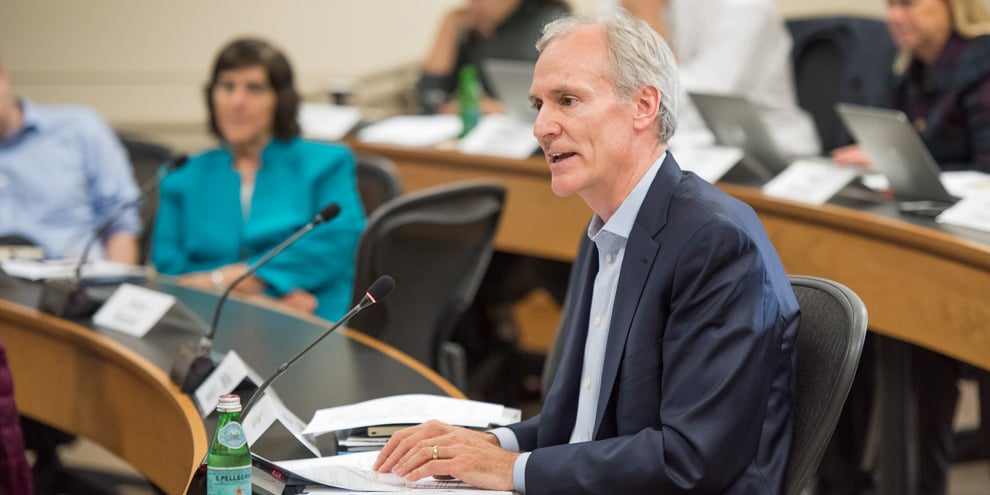In its second meeting, the 50th Faculty Senate reviewed free speech guidelines ahead of controversial conservative writer Robert Spencer’s upcoming talk at Stanford, discussed the University’s investments in offshore funds and received updates on the medical school.
Robert Spencer

Spencer will speak next Tuesday on “Jihad and the Dangers of Radical Islam” at the invitation of the Stanford College Republicans. The author of 16 books, including two New York Times bestsellers, Spencer is also a self-proclaimed Islamophobe whose visit has stirred controversy amongst the Stanford community.
During Thursday’s meeting, President Marc Tessier-Lavigne reiterated statements he and Provost Persis Drell made in a blog post published on Nov. 7, emphasizing Stanford’s commitment to ensuring free expression of ideas while maintaining an inclusive and diverse community. Although he pointed out that some forms of speech, such as hate speech, are not allowed on Stanford’s campus, the University does not otherwise restrict speech “even if it may be objectionable.”
Tessier-Lavigne also noted that the University protected the rights of the community to protest peacefully, so long as the protest did not stop Spencer’s speech.
Jeremy Bulow, the Richard Stepp professor of economics at the Graduate School of Business, also questioned whether Stanford should be paying for security for the event, suggesting instead that speakers could sign a waiver of liability.
To this, Drell asserted that such a waiver would not necessarily prevent violence.
“We need to defend free speech,” said Drell. “If it costs, it will cost.”
Offshore investments
Engineering professor Parviz Moin opened discussion of the University’s offshore investments by citing a New York Times article published on Wednesday. The article named Stanford as one of many universities that use so-called “blocker corporations” to reduce the amount of taxes they pay on endowment earnings.
Stanford’s endowment is used to fund financial aid, research and other University expenses. Generally, endowment earnings are tax exempt; however, when universities invest in private equity and hedge funds, these earnings are subject to a tax meant to keep nonprofit organizations from competing unfairly with for-profit businesses. Channeling funds through a blocker corporation – usually based in places like Bermuda or the Cayman Islands – enables Stanford and other universities to avoid this tax.
“We do it in order to meet our fiduciary obligations and minimize tax burden within the limits set by the law,” said Tessier-Lavigne. “Indeed, the state law explicitly advises trustees to consider the expected tax consequences of investing decisions and strategies. It’s critical to emphasize that Stanford fully complies with the law in all of these matters.”
Medical school
Lloyd Minor, the dean of the School of Medicine, highlighted the medical school’s continuing commitment to diversity in his report on the medical school.
Twenty-five percent of the incoming class of bioscience Ph.D. students and 26 percent of incoming M.D. students come from underrepresented backgrounds, as compared to 10 percent and 12 percent in 2012, respectively. According to Minor, the School of Medicine has been strengthening efforts to ensure affordability, including full need-based scholarships, and to recruit both students and faculty of diverse backgrounds.
However, Minor acknowledged that there is still “much work to be done” in increasing minority and female representation on the medical school faculty.
Contact Erin Woo at erinkwoo ‘at’ stanford.edu.
